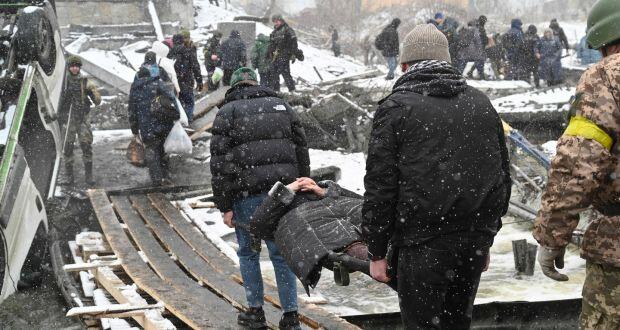Email on communications policy reminds worker of responsibility to ‘be impartial’
Tue, Mar 8, 2022, 13:02
Naomi O’Leary

People carry a wounded woman during the evacuation by civilians of the city of Irpin, northwest of Kyiv. Photography: Getty
The United Nations’ Department of Global Communications instructed staff of the international organisation not to refer to the situation in Ukraine as a “war” or “invasion”, in a move to balance political sensitivities as powerful member state Russia cracks down domestically on those who use the words.
Instead, UN staff were instructed to use the terms “conflict” or “military offensive” to describe Russia’s invasion of its neighbour, which has killed hundreds of civilians and forced two million people to flee the country.
In an email to a staff mailing list on Monday with the subject line “Ukraine crisis communications guidelines”, the director of the United Nations Regional Information Centre instructed employees not to describe the situation as a war and not to add the Ukrainian flag to personal or official social media accounts or websites.
“Some specific examples of language to use/not use at the moment,” read the email, seen by the Irish Times.
“Use ‘conflict’ or ‘military offensive’ and NOT ‘war’ or ‘invasion’ when referring to the situation in Ukraine.”
“Do NOT add the Ukrainian flag to personal or official social media accounts or websites,” the email continued, referring to a practice that has become common to show support for Ukraine.
Reputational risk’
“This is an important reminder that we, as international civil servants, have a responsibility to be impartial,” it read. “There is a serious possibility of reputational risk that has been flagged by senior officials recently.”
UN spokesman Stéphane Dujarric acknowledged the email was sent but denied it was official policy. “I don’t dispute the validity of that email but it can not be considered official policy to staff,” he told The Irish Times.
A later email sent to UN staff on Tuesday morning, also seen by The Irish Times, suggests the language policy regarding Ukraine was updated to reverse the initial guidance and allow for the use of “war” and “invasion”.
The UN Spokesperson Twitter account initially described The Irish Times’ reporting as “fake”, before deleting the Tweet.
The instruction to staff not to use “invasion” and “war” fuelled concern that the organisation was going too far in a bid to avoid offending Russia, a powerful member state that holds one of the five permanent seats on the UN Security Council.
“It’s hard to believe that the UN could essentially impose the same kind of censorship that the Kremlin imposes inside Russia now by banning the use of the words ‘war’ and ‘invasion’,” wrote Ukrainian foreign minister Dmytro Kuleba. “UN reputation at stake.”
Russian officials do not use the word “invasion”: the Kremlin’s preferred term to use is “special military operation”, and the regime of Vladimir Putin has taken efforts to enforce this language domestically.
Two days after Russia launched its offensive, media regulator Roskomnadzor ordered local news outlets to delete reporting that used the words “assault,” “invasion,” or “declaration of war”, or risk being fined or blocked.
Prison terms
This was followed by a new law imposing prison terms of up to 15 years for anyone who spreads news deemed to be “fake”, the arrest of thousands of people who protested against the war, the shuttering of two local independent broadcasters, and the blocking of international media websites including the BBC and Deutsche Welle.
The Soviet Union was a founding member of the United Nations when it was set up with the aim of preventing future wars in the wake of the second World War, and the Russian Federation inherited its seat and permanent UN Security Council (UNSC) membership when the bloc dissolved in 1991.
As a temporary elected member of the UNCS, Ireland has lobbied for the removal of the veto system that allowed Russia as one of its five permanent members to block a council resolution that would have demanded that Moscow stop its attack on Ukraine and withdraw its troops.
A resolution demanding Russia’s withdrawal was later overwhelmingly passed by the 193-member General Assembly of the UN, something that is politically significant, but unlike UNSC resolutions cannot be legally binding.